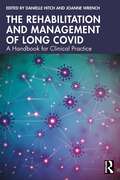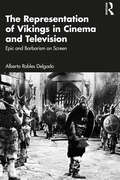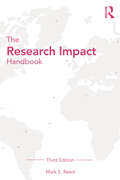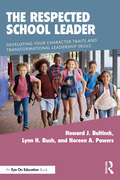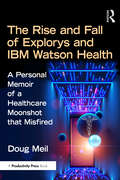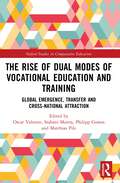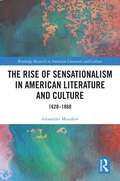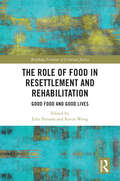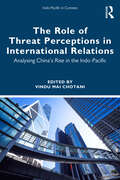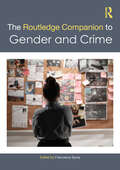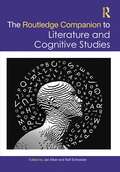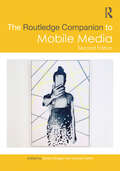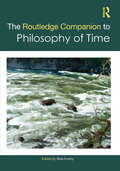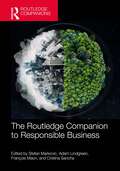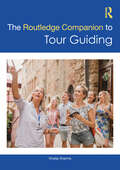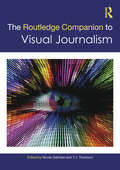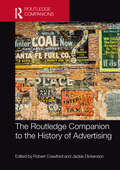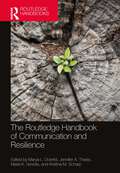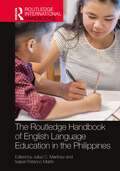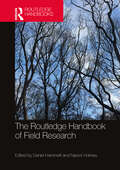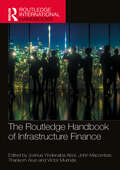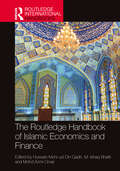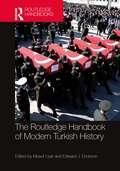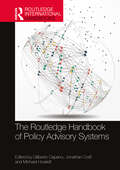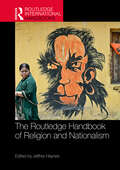- Table View
- List View
The Rehabilitation and Management of Long COVID: A Handbook for Clinical Practice
by Danielle Hitch Joanne WrenchThis ground-breaking volume provides the first comprehensive resource for health professionals managing the rehabilitation of people experiencing Long COVID.Founded on therapeutic principles and evidence from other chronic conditions, and informed by clinician and lived experience expertise, the book advances the narrative of Long COVID from “what do we know” to “what can we do.” It skilfully integrates the latest evidence of the condition with practical therapeutic tips, supporting readers to develop the knowledge and skills needed to provide effective and respectful care for people with Long COVID. The lived and living experience of those with the condition is embedded in every chapter.Written by clinicians, researchers, and lived experience experts, this book is an invaluable resource for health professionals in all services and settings.
The Representation of Vikings in Cinema and Television: Epic and Barbarism on Screen
by Alberto Robles DelgadoExploring the reception and representation of Viking culture in audiovisual media, particularly in cinema and television, this book offers a comprehensive chronological overview of films and television programmes produced in the period from the early 20th century to the present.This volume conceptualises the aesthetic and ideological elements that have shaped the portrayal of Vikings and traces how these have evolved over time. The chapters provide an in-depth analysis of a wide-ranging body of audiovisual works, examining not only the representations themselves but also the broader cultural and historical contexts in which they were produced.Since cinema often reflects the society in which it is created, understanding the motivations behind Viking imagery across different cultural, political, and geographical settings is essential. A distinctive feature of the study lies in its spatial scope: films from various national industries – including those of the United States, the Nordic countries, Italy, Russia, and Poland – are examined to reveal the diverse ways in which Viking identity has been imagined, shaped by each country's own historical and historiographical engagement with the Nordic world.In addition, the book includes an appendix featuring a meticulously compiled catalogue of all the films and series analysed. This resource is intended to support readers who may not be familiar with the works discussed, enhancing their engagement with the study’s conclusions.The Representation of Vikings in Cinema and Television is essential reading for scholars, students and cultural historians interested in the evolving place of Viking imagery in modern popular culture.
The Research Impact Handbook
by Mark S. ReedThis important book will equip you with evidence-based tools you can use immediately to create a step change in your impact. Helping you recognise and demonstrate the wider benefits of your work, it will give you the practical knowledge and confidence to identify practical ways to maximise the impact of your research. Written by renowned impact expert Mark S. Reed, this third edition has been fully updated with the latest evidence and includes new material on the ethics of engagement and impact, using social media, and influencing policy. Offering strategies to effectively engage with diverse groups, the book features: Five principles to fast-track your impact and practical steps to make this happen. Tools and techniques for designing and facilitating workshops, driving impact online, presenting with impact, influencing policy and more. New ‘How To’ guides including how to evidence impacts from social media; capturing the impact of training; making podcasts, videos and infographics; designing projects for impact; starting newsletters; and developing an institutional impact strategy. Packed with practical tips, techniques, templates, case studies and stories, this book is essential reading for PhD students, independent researchers and academic staff at any career stage wanting a clear framework to fast-track the impact of their research.
The Respected School Leader: Developing Your Character Traits and Transformational Leadership Skills
by Howard J. Bultinck Lynn H. Bush Noreen A. PowersThis book offers an unprecedented look at a key component to becoming a collaborative, inclusive, and transformational school leader: respect. This practical resource takes you on a journey to achieve the highest level of respect as a school leader and includes a groundbreaking model that defines “respect” and provides you with specific tools to determine whether you’ve attained respect and how to leverage this for personal growth, success, and for sustainable school improvement. Case studies, stories, and narratives of highly respected school leaders are highlighted throughout. This book will provide you with all the self-reflection tools and exemplars necessary for your path forward to becoming a respected, inclusive, collaborative, and transformational school leader.
The Rise and Fall of Explorys and IBM Watson Health: A Personal Memoir of a Healthcare Moonshot that Misfired
by Doug MeilIn 2015, Explorys was a healthcare intelligence cloud company that had built one of the largest clinical data sets in the world, representing more than 50 million lives. It provided secure cloud-based solutions for clinical integration, at-risk population management, cost-of-care measurement, and pay-for- performance. The acquisition of Explorys complemented and strengthened the IBM Watson Health Cloud platform and empowered IBM’s vast ecosystem of clients, partners, and medical researchers to surface new connections among diverse and previously siloed healthcare data sets. The combination of both Explorys and IBM Watson Health was expected to spur the creation of a new generation of data-driven applications and solutions designed to advance health and wellness. So, what went wrong? IBM Watson Health is a massive case study in healthcare innovation gone awry. IBM was one of the oldest and largest technology companies in the world and was riding a tailwind with IBM Watson’s Artificial Intelligence success on Jeopardy in 2011. The Watson Health division was seeded with multiple healthcare acquisitions, one of them being Explorys. Explorys had a portfolio of hosted population analytic solutions and the largest clinical dataset in the United States at the time, at approximately 50 million de-duplicated patients. The newly created division was loaded with potential and seemed destined for success. Yet Watson Health went from being founded in April 2015 to imploding in May 2018 in a little over three years and took Explorys down with it. IBM Watson Health’s ascent and descent were covered by both healthcare and mainstream media. Watson Health was self-described as IBM’s "Moonshot" in healthcare. This venture failed, and it cost IBM billions of dollars. These were expensive lessons on managing innovation in healthcare, but also on managing innovation in general. This book chronicles the story of Explorys and IBM Watson Health and what led to its downfall in just three short years. Written by one of Explorys’ founding engineers, the book relates the rise and fall of both Explorys and IBM Watson and provides a message for future tech entrepreneurs and IT managers alike.
The Rise of Dual Modes of Vocational Education and Training: Global Emergence, Transfer and Cross-National Attraction (Oxford Studies in Comparative Education)
by Matthias Pilz Philipp Gonon Oscar Valiente Srabani MaitraRecognising the regular adoption, by countries across the globe, of the vocational education and training (VET) model already so prevalent in German-speaking countries such as Austria, Germany and Switzerland, this book spotlights dual modes of VET, depicting its global emergence and subsequent cross-national attraction.Globally, the practice of combining schools and workplace practice and learning is seen as a gold-standard for cross-national attraction: the comparison between, and borrowing of, national policies. Using case studies from Eastern Europe, Azerbaijan, India and Latin America, chapters demonstrate how these countries aim to support dual modes of VET to strengthen their own economic and cultural weight abroad, as well as accelerating developmental goals for industry. Further, these countries look to European VET models for integration of their youth both in the labour market and in establishing alternative pathways for young people in the workforce. Chapters discuss the significance of the international context in understanding the nuance involved with duality in VET adoption, as well as shedding light on the transnational diffusion of education policies at both national and global levels.This book will be of use to scholars, postgraduate students and researchers in the fields of international and comparative education, vocational education and training, and adult education and lifelong learning more broadly. Policy makers working in international policy transfer may also benefit from this volume.
The Rise of Sensationalism in American Literature and Culture: 1620-1860 (Routledge Research in American Literature and Culture)
by Alexander MoudrovThe Rise of Sensationalism in American Literature and Culture: 1620‑1860 argues that the rise of the American tradition of sensationalism can be better understood in the transatlantic context. Early American writers were unquestionably influenced by various forms of European sensationalism. At the same time, they often felt compelled to distance themselves from their European counterparts whom they accused of promoting voyeuristic indulgence in the scandalous and demoralizing their readers. American writers typically claimed that they turned to the scandalous only to promote legitimate religious, political, and social causes. In this respect, their approach reflected the Puritan tradition of didactic sensationalism in which provocative themes (religious dissent, crime, and sex scandals) were routinely exploited in ostensibly well‑intentioned publications (sermons, crime reports, and journalism). What is remarkable about the antebellum period is that it saw a dramatic transformation of American sensationalist literature as popular writers started to incorporate elements of European sensationalism while trying to preserve the didactic conventions of their predecessors.
The Role of Food in Resettlement and Rehabilitation: Good Food and Good Lives (Routledge Frontiers of Criminal Justice)
by Julie Parsons and Kevin WongExploring the role of food in enabling people with convictions to live a “good life”, this book examines the tangible ways in which growing food, cooking, and eating together has the potential to be both transformative and small steps incremental in facilitating desistance journeys for people with convictions.At its most reductive, food sustains us physically; it’s the fuel which keeps us alive. Of course, emotionally, culturally, and socially it does more than that. This edited book addresses an under-researched area of resettlement and rehabilitation which has real-world application to policy and practice in criminal justice and related areas such as mental health, physical health, employment, and education. Importantly, given the relatability of food growing, cooking, and eating to the wider public, it offers opportunities to connect the desistance journeys and lives of people with convictions to the wider public.The Role of Food in Resettlement and Rehabilitation will be of great interest to students and scholars of criminology, sociology, social work, and food studies. It is also important reading for government policymakers in criminal justice and health care, social policy, and criminal justice practitioners, including prison governors, social workers, and providers of services for people with convictions in custody and community.
The Role of Threat Perceptions in International Relations: Analysing China’s Rise in the Indo-Pacific (Indo-Pacific in Context)
by Vindu Mai ChotaniWith China’s rise in the Indo-Pacific, this book systematically analyses and explores the complex reality of questions regarding threat perception—why and when do states perceive or do not perceive China as a threat, and what influences or drives these perceptions? How have their perceptions evolved and changed over time? To provide deeper insight, it moves beyond traditional Realist explanations of the “China threat”. Additionally, by engaging in a diverse theoretical discussion, it studies the various perspectives of key Indo-Pacific players: India, Japan, China, the United States, Australia, the Association of Southeast Asian Nations, and South Korea. Mapping the formation and changing perceptions of threat regarding China’s rise, this book would be essential reading for scholars, students, and researchers of international relations studying the Indo-Pacific region, threat perception, global politics, geopolitics, foreign policy, Chinese studies, middle powers, and strategic studies. It will also be a useful handy reference for foreign policy experts, government bureaucrats, and think tanks.
The Routledge Companion to Gender and Crime (Routledge Companions to Gender)
by Francesca SpinaThe Routledge Companion to Gender and Crime offers a comprehensive, intersectional, and global exploration of gender and crime, addressing patterns of offending and victimization, criminal justice system challenges, and the evolving role of gender in criminal justice worldwide.This edited collection will help readers gain an understanding of the intersectional and global dynamics of gender and crime, including offending and victimization patterns, justice system challenges, and professional practices. It examines gendered differences in criminal processing, sentencing, and supervision, and touches upon contemporary issues that practitioners face related to gender and sexuality, such as gender and health in prisons. The book delivers this through chapters written by experts, integrating cutting-edge research, real-world applications, and diverse perspectives to address contemporary issues in criminology and criminal justice. This handbook expands upon existing works to include a background on gender and crime, theories related to gendered victimization and offending, and the importance of intersectionality.The Routledge Companion to Gender and Crime will be of interest to both undergraduate and graduate students in criminology and criminal justice programs, as well as researchers and educators in gender, politics, and sociology.
The Routledge Companion to Literature and Cognitive Studies (Routledge Literature Companions)
by Jan Alber Ralf SchneiderThe Routledge Companion to Literature and Cognitive Studies offers a comprehensive survey of cognitive approaches to literature, introducing the influential theoretical tools and latest developments in this vigorously multi-disciplinary field, with leading scholars illuminating the cognitive, affective, and bodily dimensions of literary reading. Comprised three main sections, this Companion oversees the history of the field, core issues and topics, and the vital new debates of cognitive theory. This volume introduces readers to the many new tools and methodologies in the field, including: the context of the first generation of cognitive literary studies mental representations and information-processing paradigms critical debates and developments, including cognitive cultural studies, 4E cognition and literature, as well as empirical investigations of cognitive processes approaches to a variety of literary genres and media This comprehensive Companion provides an important reference work for upper-level students and researchers delving into the interdisciplinary approaches to literature and cognitive studies.
The Routledge Companion to Mobile Media (Routledge Media and Cultural Studies Companions)
by Larissa Hjorth Gerard GogginThis second edition of the groundbreaking Routledge Companion to Mobile Media brings together newly commissioned essays and cutting-edge research alongside updated essays from the original volume to create a definitive guide to mobile communication studies.The collection, which brings together original articles by a global roster of contributors from a variety of disciplines, sets out to contextualise the increasingly convergent areas surrounding social, geosocial, and mobile media discourses. Essays provide comprehensive and interdisciplinary models and approaches for analysing mobile media and draw upon a wide range of global case studies, from China, Africa, Southeast Asia, the Middle East, and Latin America to Europe, the UK and the US. This new edition also covers the many changes in the field over the last decade: from dating apps, AI, mobile phones, travel, games and digital transactions through drones, blockchain, microbilities, virtual reality, touch and haptic technology, to the role of mobile media in health, climate change, mobiles and electrification, digital migrant cultures, arts, creativity and politics—and beyond.This second edition remains an essential resource for upper-level students, researchers and scholars interested in mobile media research.
The Routledge Companion to Philosophy of Time (Routledge Philosophy Companions)
by Nina EmeryThe Routledge Companion to Philosophy of Time is a comprehensive and authoritative guide to a growing subfield of philosophical research, which spans traditional and contemporary debates about the nature of time, as well as a diverse set of historical, geographical, and cultural contexts. This book also highlights the interdisciplinary connections between philosophy of time and nearby fields including history, physics, psychology, cognitive development and more.Comprising 50 chapters by a diverse team of contributors from all over the globe, the Companion is divided into five parts: I History of Philosophy of TimeII Contemporary Metaphysics of TimeIII Time and PhysicsIV Time and MindV Further ConnectionsThe volume is essential reading for students and researchers of philosophy who are interested in exploring the philosophical issues related to time. It is also a valuable resource for philosophers in adjacent subfields including philosophy of mind, philosophy of physics, and history of philosophy, as well as researchers in related fields in the sciences and social sciences.
The Routledge Companion to Responsible Business (Routledge Companions in Business, Management and Marketing)
by Adam Lindgreen François Maon Stefan Markovic Cristina SanchaContemporary companies are expected to behave ethically and responsibly toward their stakeholders and to provide social and environmental good. Key stakeholder groups, including employees, consumers, investors, and public authorities, increasingly demand that companies deliver products and services in responsible yet economically sound manners and act in accordance with moral obligations and financial requirements. Such mounting societal expectations and institutional pressures relate to complex concerns, including environmental and climate impact, working conditions, and human rights, both locally and oversees. In this context, as companies now appear to commit to comprehensively tackle ethical, social, environmental, and economic challenges, concerns increasingly are raised as to whether most companies in the end can indeed contribute to societal and environmental good and transform how they operate to create value responsibly, considering the success and impact of so called corporate social responsibility or sustainability policies.In recent decades, while some companies have advanced on their social and environmental responsibility journey, other companies have engaged in ethical, social, and environmental initiatives in manipulative and insincere way, or merely as a rhetorical tool to maintain legitimacy. Together with governments and business partners, these companies are largely failing to deliver for society and the environment. Subsequently, more than ever before, understanding what it means to do business responsibly and how business actors can engage constructively in ways that support the development of resilient business practices, forms, and organizations that contribute to generate positive impact for society and the environment and generate the type of economic value needed to address the key challenges of this century is central.On this background, this edited volume sheds light on different crucial themes and approaches spanning historical, conceptual, operational, critical, practical, and prospective considerations that have animated the field of business and society in the last decades, and that are instrumental or have the potential to drive constructive research discussions and business efforts.The central aim of the book is to set the research agenda for the next five to seven years, to redefine existing areas within the context of international research, and to highlight emerging research areas in need of further investigation, representing a prestige reference work providing an overview of the subject area of responsible business, primarily for academics, researchers, postgraduate students, as well as reflective practitioners.
The Routledge Companion to Tour Guiding
by Shailja SharmaThis comprehensive handbook offers an in-depth exploration of both the theoretical and practical dimensions of tour guiding as a profession. It provides readers with valuable insights into examining the key and dynamic role of tour guides in the tourism industry and the evolving expectations of modern travelers. Enriched with global case studies spanning a diverse range of niche tours offered as tourism products around the world, the book highlights emerging trends and the importance of continuous skill development in the profession. It covers topics such as pre-tour preparations, the art of effectively opening and closing tours, engaging narration at attractions, the importance of technology for tour guides, and the nuances of managing diverse groups. Additionally, it delves into the growing practice of virtual tour guiding and offers practical guidance on addressing guest inquiries, managing grievances, and handling emergencies besides addressing the new emerging trends in the field of tour guiding.This companion is designed for students and educators in tourism, travel, and hospitality management programs worldwide. It serves as a valuable training manual for national, regional, and local tourism authorities, as well as tour operators and travel agencies. Furthermore, both seasoned professionals and aspiring tour guides will find it an essential reference to refine their skills and stay updated with contemporary best practices.
The Routledge Companion to Visual Journalism (Routledge Journalism Companions)
by T. J. Thomson Nicole DahmenRepresenting the first collection of its kind, The Routledge Companion to Visual Journalism introduces fundamental topics and ideas, delineates the diversity and complexity of this growing field, and creates a foundation for future scholarship and study.In the contemporary digital media landscape, still and moving images, interactive visualizations and virtual reality are increasingly important to attract attention, cultivate engagement, inform and influence opinions, and provide a more emotive and immediate viewing experience for news audiences. This Companion draws together leading voices from academia and industry to survey this dynamic and ubiquitous mode and inspire dialogue. Along with an introduction and conclusion, the volume is structured in five sections and covers people and identities; practices and processes; technologies, equipment, and forms; theories, concepts, and values; and audience interpretation and impact. Beginning by looking at the history of visual news, chapters go on to explore how visual news is created; how journalists visually represent gender, race, sexuality, (dis)ability, "elites," and ordinary citizens; key ethical ideas and theories behind the creation of visual news; and how visual news is processed, drawing in research from eye-tracking, media psychology, and media literacy. The book ends with a critical look at the future of the field.The Routledge Companion to Visual Journalism is a recommended resource for all advanced students and researchers of visual journalism and communication and will also be of interest to practitioners in these fields.
The Routledge Companion to the History of Advertising (Routledge Companions in Marketing, Advertising and Communication)
by Robert Crawford Jackie DickensonWith expansive global coverage from an international range of experts, this unique volume critically examines the stakeholders and influences on the production, dissemination, and consumption of advertising – from its early history via the development of mass advertising to the emergence of the digital age. Advertising has been and remains one of the most visible and influential forms of communication globally and the advertising industry is valued in the hundreds of billions worldwide.While its size, reach, and influence have attracted considerable scholarly attention, the insights from its historical growth and development are less well understood yet provide invaluable insights. This authoritative reference volume provides not only a critical overview of the state of current knowledge and research in advertising history, but also a global overview of the industry’s growth and development.This Companion is a comprehensive source of current scholarship and debate on the history of advertising for advanced students, educators, and researchers in advertising, marketing, communication, and media studies, and will provide an invaluable one-stop literature resource for academics and informed professionals alike.
The Routledge Handbook of Communication and Resilience (Routledge Handbooks in Communication Studies)
by Kristina M. Scharp Marya L. Doerfel Maria K. Venetis Theiss, Jennifer A.Drawing on expertise from communication scholars who examine resilience within and across individual, relational, group/team, organizational, inter-organizational, and community levels, this handbook provides a wide-ranging resource for theory building, empirical investigations, and practical applications.Chapters in this handbook bring awareness to how resilience is constituted through human communication processes. As a baseline, Part I begins with chapters that explicate and conceptualize resilience as a process that shapes and reflects communication behavior at multiple levels. In Part II, chapters focus on micro communication processes in the enactment of resilience at an interpersonal level in domains such as close relationships, families, and small groups. In Part III, attention shifts toward examining resilience processes in professional domains within and among organizations. Part IV considers macro communication processes, looking at how communities can build resilience, sustainability, and engagement through communal activities that cultivate strong networks and promote the health and safety of the community All chapters feature a discussion of practical implications for policy investments and/or interpersonal interventions for building and maintaining sustainability and resiliency.This handbook is a useful resource for scholars and advanced students in communication studies, social psychology, sociology, human development, public policy, and family sciences.
The Routledge Handbook of English Language Education in the Philippines
by Isabel Pefianco Martin Julius C. MartinezThis handbook serves as a comprehensive resource on English language education in the Philippines, addressing a wide range of issues including ideologies, multilingualism, identities, policies, methodologies, assessment, teacher education, and curriculum.Chapters cover a range of educational contexts—from Luzon to Mindanao islands, from basic to higher education, and from formal to non-formal schooling. This book upholds the think and do otherwise perspective by problematizing contemporary paradigms and practices that operate from naturalized ideas inherited from the American colonizers. This includes repairing pedagogies that redress injustices experienced by historically marginalized groups and hoping for possibilities and approaches to teaching and learning English that are just, equitable, and inclusive. The six sections in the Handbook bring up conditions for thinking and doing otherwise, pointing to ways in which genuine changes can start to happen. Scholars from diverse backgrounds come together in this handbook to take collective ownership of English language education in the Philippines. This ownership does not mean ignoring and disposing of the country’s colonial past but reclaiming English language education as an ongoing project instead. This handbook likewise demonstrates that such a project makes it possible for wider audiences to see that Global South scholars from and in the Philippines also have much to teach the rest of the world about thinking and doing otherwise and, by extension, problematizing, repairing, and hoping.Given its scope and breadth, the handbook is an invaluable reference for students, pre-service and in-service teachers, teacher educators, researchers, and policymakers interested in English language, language education, TESOL, sociolinguistics, and applied linguistics.
The Routledge Handbook of Field Research
by Naomi HolmesThe Routledge Handbook of Field Research presents a comprehensive, go-to resource for staff and students in preparing for and thinking about the doing of field research, including both individual fieldwork and group field classes.Framed by rapidly evolving debates relating to environmental and social justice, decolonialism, the climate crisis, and post-truth society, as well as taking into account ethical, health and safety, and other practical considerations, researchers are faced with a complex and evolving set of factors when making decisions. Working from foundational questions relating to the need for and importance of field research, of where the ‘field’ is, through logistical and practical concerns, to complex debates around equality and diversity, power relations, sustainability and ethical conundrums, this book is not a simple, formulaic ‘how to’ guide. Instead, the handbook offers a more critical and reflective approach – acting more as a ‘how to start to think critically about’ text. In providing a comprehensive and cutting-edge overview of key debates and considerations in the planning, doing, and wrapping up of field research, the handbook shares examples and reflections from experienced field researchers and field class leaders as well as scenarios, debates, and critical questions to help guide field researchers through their research journey. While there is a rapidly expanding array of books on research methods and epistemologies, this handbook offers a unique contribution that addresses distinct gaps in the current literature. Through a strong emphasis on field class and group-based field research, this handbook offers a unique resource to support field class leaders in thinking through the design and doing of field classes, and adopts a pedagogical approach in ‘asking difficult questions’ of the reader rather than offering ‘the answer’. In so doing, we promote a deeper, reflective engagement with the complexities of the research journey.The Routledge Handbook of Field Research includes contributions from over 50 leading authors, culminating in an essential resource for both experienced field researchers and field class leaders as well as newcomers to lone and group-based field research.
The Routledge Handbook of Infrastructure Finance (Routledge International Handbooks)
by Joshua Yindenaba Abor John Macomber Thankom Arun Victor MurindeThis handbook provides a comprehensive overview of infrastructure financing from a global perspective. It offers an extensive examination of infrastructure financing worldwide. It encompasses a wide range of subjects concerning infrastructure finance, including different project types, financing options, and the functions performed by public and private sector entities in financing and overseeing infrastructure initiatives. Given that infrastructure investment is crucial to socio-economic growth and development, it has become a critical policy priority for governments, investors, and other stakeholders around the world. It is intended for a wide range of readers interested in infrastructure finance, including academics, researchers, students, policymakers, and practitioners.The handbook offers an in-depth and interdisciplinary overview of infrastructure finance, covering topics such as project finance, public-private partnerships (PPPs), institutional investors, risk management, sustainability, and regulation. As a result, the book is relevant to those studying or working in fields such as project and infrastructure finance, finance, development finance, accounting, economics, public policy, real estate, and sustainability. The global perspective of this book also makes it valuable for those interested in the unique challenges and opportunities associated with infrastructure finance in different regions of the world. Overall, The Routledge Handbook of Infrastructure Finance serves as a valuable resource for anyone seeking to deepen their knowledge and understanding of infrastructure finance in today's complex and rapidly changing global economy.
The Routledge Handbook of Islamic Economics and Finance (Routledge International Handbooks)
by M. Ishaq Bhatti Hussain Mohi-ud-Din Qadri Mohd Azmi OmarIslamic finance is one of the fastest-growing sectors of the finance industry due to a number of factors, including the technology boom, fintech, blockchain, and higher oil and commodity prices, but also, in particular, its demand by 1.5 billion Muslims around the globe. It enjoys sustainably higher positive returns compared to its conventional finance counterparts, specifically during financial crises. Moreover, it plays a major role in implementing the UN’s Sustainable Development Goals due to its non-traditional source of long-term fund-financing that advances social, environmental, and economic goals. The Routledge Handbook of Islamic Economics and Finance offers a detailed introduction to the current scholarship in this ever-expanding and emerging field.The book is divided into three parts, covering Islamic business, Islamic economics, and Islamic finance, respectively. Each chapter provides a balanced overview of current knowledge, identifying issues and discussing the relevant debates. The book seeks to explore the current developments and trends in Islamic economics, Islamic banking, and Islamic capital markets. It also covers the areas of Islamic social finance, impact investment and Islamic microfinance, SMEs, poverty alleviation, and financial inclusion. Additionally, it launches the debate on the emergence, progress, challenges, and future potential of Islamic fintech and the Islamic digital economy. Furthermore, it sheds light on subjects such as the marketing of Islamic financial services and products, the circular economy, and the blue economy from an Islamic financial perspective.As well as surveying the current state of the art, the authors also reflect on where the research agenda is likely to advance in the future, making this the definitive resource for scholars and researchers in this area.
The Routledge Handbook of Modern Turkish History (Routledge History Handbooks)
by Edward J. Erickson Mesut UyarThis handbook is an innovative recasting and reinterpretation of modern Turkish history centered on war and society. It covers much neglected conflicts and wars and provides new insights about its complex politics, military, diplomacy, and people.The Turkish Republic was born after a series of wars which dismantled the Ottoman Empire and left the foundation of a state with new and reduced borders. Turkey's foreign policy has been characterized for the last century by Mustafa Kemal Atatürk's principle of "peace at home, peace in the world", but in practice, it has had to fight foreign wars outside of its geography and battle counterinsurgency inside its borders against various rebel movements. Although wars and conflicts were instrumental in shaping Turkey, they have received very little scholarly attention, and they are mostly absent in western studies of modern Turkey. Rather than advocating for a single accepted interpretation of Turkish history, this book aims to highlight the complexity of modern Turkish history and the diversity in interpretations.Presenting a coherent and condensed history of modern Turkey in a reader-friendly way, this handbook offers students and general readers the sound background to better understand Turkey within its international and transnational context.
The Routledge Handbook of Policy Advisory Systems (Routledge International Handbooks)
by Michael Howlett Jonathan Craft Giliberto CapanoThis handbook comprehensively reflects, presents and summarises both first and second wave scholarship into policy advisory systems (PAS). Bringing together leading scholars to engage persistent as well as emergent themes, the handbook provides a single volume highlighting both classic and new directions for PAS research, summarising both existing knowledge and outlining possible future findings.Covering the activities of a range of advisory system members from think tanks to public services, this handbook examines a broad set of administrative traditions and institutions affecting such systems in democratic, developing, authoritarian political regimes, and in supranational and transnational governance arrangements. It focusses on the systematic interactions of the supply, demand and brokerage of policy advice in different jurisdictions, and shows how these systems operate and evolve.The Routledge Handbook of Policy Advisory Systems is essential reading and an authoritative reference for scholars, students, researchers and practitioners of public policy, public administration, and public management. Those interested in comparative politics and government, international and public organisations and the use, influence and impact of policy advisory systems in a range of policy domains will find its comprehensive scope and coverage of great benefit.
The Routledge Handbook of Religion and Nationalism (Routledge International Handbooks)
by Jeffrey HaynesThe Routledge Handbook of Religion and Nationalism comprehensively surveys the sub-disciplinary area of religious nationalism, an interaction between religion and nationalism.The handbook has a global focus, including sections on how, why and with what effects religion and nationalism impact politically both domestically and internationally, as well as discussing the future of the field and religious nationalism ‘on the ground’. Bringing together a range of expert contributors, the handbook is split into two main parts: core issues and country case studies. Religions studied include Islam, Christianity, Hinduism, Judaism and Buddhism, across countries in Asia, Europe, the Middle East and North Africa, Sub-Saharan Africa, North America and South America. The core issues examined cover nationhood as a concept; historical perspectives on nationalism; theoretical approaches to nationalism; the state; populism; violence and conflict; immigration; terrorism; globalisation; the post-secular world; and foreign policy.Given the comprehensive nature of the handbook, it provides crucial, complementary reading for students, scholars and professionals across politics, religion and policy making.
